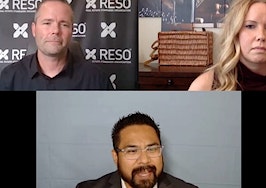The brokerage landscape is changing and in order to remain relevant multiple listing services are going to have to focus on the end users of listing data: agents, buyers, tech companies and investors looking to buy.
That’s according to Clelia Peters, venture partner at Bain Capital Ventures, who spoke at the Council of MLS’s (CMLS) first virtual conference Tuesday in a session called “Consumers, Supply and Technology: A Vision for What’s Coming Next for the MLS.” Peters is also president of Warburg Realty and editor at large of Inman.

Clelia Peters at CMLS’s first virtual conference, September 29, 2020
“We’re going to have to redefine who we are as the MLS, and also push ourselves to think about who we serve. Ultimately, we are going to be served as a community by defining our core user as the end user of this data,” Peters told conference attendees.
“Historically, I think we have really focused on the supplier of the data, in particular on the brokerage supplier. But in order to maintain our relevance, I think we’re going to need to be thinking a couple of steps ahead, and in my experience, the most effective way to do that is to stay really close to your customer, and what they need.”
In her presentation, Peters defined the MLS as “a platform which connects those who have listing data with those who would like to search listing data.” First, she dove into the particulars of the types of brokerages supplying the data, including iBuyers, “neo-brokers,” “elite agent platforms,” and traditional brokerages.
Ibuyers, which include brokerages such as Opendoor, Zillow Homes, Offerpad and Redfin Now, typically deal in markets where the homes are fairly uniform and therefore easier to value and focus on low-to-mid value price ranges. In most cases, Peters noted, their core business model either has no agent role or a limited agent role. IBuyers make their money through service fees, spreads (the difference between what they buy a home for and what they sell it for), seller leads and secondary services such as title and mortgage.

Source: Clelia Peters
They see buyers and sellers, not agents, as their core customer, which is a difference from traditional brokerages, according to Peters. They also focus on engaging consumers at the start of their journey as sellers. That could theoretically make them a competitor to MLSs, she said.
“Right now, it is the listing aggregators who effectively are the front end for our industry data, who have almost created a bit of a monopoly around the beginning of the seller experience. Most sellers start their search with some sort of aggregate search experience even if ultimately they move to searching with their broker’s website or with a more personalized experience,” Peters said.
“What some firms hope to do is, by essentially being the place that sellers could go to get an easy valuation for their listing, they want to be the place that sellers go at the start of their search. Ultimately, if they are able to engage with enough sellers, either via their direct purchase model or through other hybrid models where maybe they would evolve the model to have exposure to more listings, they could really create an alternative to the MLS where they had the majority of listing inventory associated with their platform.”
In fact, venture capitalists who are pouring an “enormous” amount of money into the real estate space are banking on iBuyers becoming that starting point, Peters said.
“Many people invested behind these models out of a desire to see them evolve into this alternate start of the search journey,” she added.
“This does not necessarily require any action to be taken on the part of the MLS community,” Peters continued. “I just want everyone who’s listening to this to understand that … some of these models are customers but some of them could ultimately evolve into competitive platforms if we’re not able to really think about how we keep up and continue to match our customers, both agents and consumers, where they’re at and in terms of what they’re looking for.”
Neo-brokers are companies with an integrated service model that are agent-based but those agents are often employees and are highly trained to provide a consistent customer experience, according to Peters.
Neo-brokers are “going to play an increasingly significant role in the market in the coming five to 10 years,” Peters said.
Such firms have a 50 percent to 80 percent attachment rate for secondary services, compared to 20 percent or less for traditional brokerages, according to Peters. Redfin, Orchard, flyhomes, Homie and Reali are examples. They also see buyers and sellers, not agents, as their core customer.
“One of the reasons I believe historically we’ve struggled in the brokerage industry to sell secondary services … is that our independent contractor model prevents us from doing really deep training of our agents or creating [sales] quotas,” Peters said.
Nearly all neo-brokers use a discounted commission model because that high attachment rate means it’s not as important for them to make money on that upfront transaction, according to Peters.
“They can extract value from the customer at every point along the value chain since they own the entire experience that the customer has,” she said.
Elite agent platforms, which include brokerages such as Compass and Side, maintain the full commission, independent contractor model of traditional brokerages but only recruit top-producing agents and arm them with tech tools.
“I strongly believe that the agent model will continue to be relevant in many markets and in many parts of markets all over the country,” Peters said. “I do not believe that innovation is going to mean that we don’t have brokerages or agents anymore.”
“I strongly think that that is an erroneous belief on the part of many diehard technologists, but I think that what we’re going to see is that agent model prevails in mid-to-high value markets, or the mid-to-high value parts of certain markets, and in mid-to-high complexity markets or parts of a market.”
Elite agent platforms and their attendant tools that make agents more efficient are going to create “a golden age” for top agents, according to Peters. Such “next-gen brokerages” will continue to win agents, but will need to build, partner or buy technology to compete, she said.
“That’s going to put even more pressure on them to be supported by really technologically-enabled MLS systems,” she said.
In order to remain relevant, MLSs will need to focus on what’s best for consumers of data and offer all data that’s relevant to residential housing in a market, Peters said. That enriched data could mean offering rentals, for example, which are a rising share of households and are also increasingly being held by institutional investors who “are going to want a more professional level of service” from the MLS, Peters said. Only about 14 percent of rental listings are included in MLS feeds today, which means tech companies are filling in the gap by building parallel marketplaces of rental listings, she noted.
“This presents a really interesting opportunity for the MLS to provide additional services to owners or agents or to think about how they’re going to partner with some of these next generation players who are coming in to build those relationships themselves,” she said.
“We as a community ignore the increasing significance of rental listings at our peril. For many people renting is their introduction to how they relate to their home. And while many of those people will graduate into homeownership, I think an increasing number will just opt to continue to rent or even with boomers will go back to renting after an extended period of homeownership. It’s an existential question for us as the MLS community how much we will engage with them.”
She also emphasized that “an absolute priority” for MLSs should be to adopt an open API system to allow “next generation companies” to share information.
“One of the fastest ways to ensure that the MLS system is leapfrogged will be for us to fail to meet the need for next generation companies to consume information via API. If we don’t do it, they will find someone else who can provide this for them,” she said.













